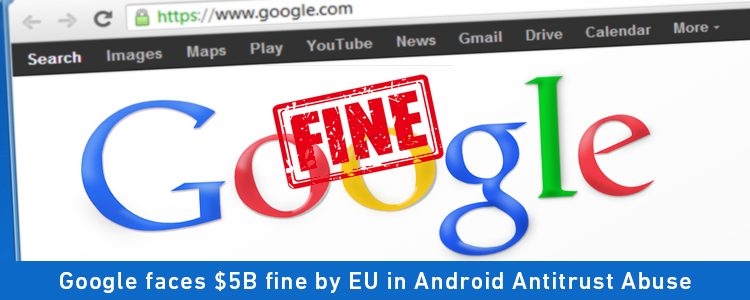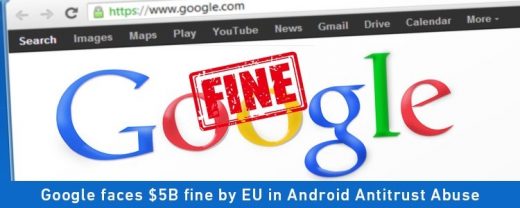Google And What’s Behind Alphabet’s $5B EU Fine
Google And What’s Behind Alphabet’s $5B EU Fine
When Alphabet released second-quarter earnings results for 2018 on Monday, the company provided details and numbers to highlight the impact of the European Commission fines on operating income, net income and earnings per share. Late last week, after the EU announced the $5 billion antitrust fine, Search Marketing Daily caught up with Gartner Research Director Charles Golvin to talk about the future for Google and advertisers as a result of the fine.

Reported by Bloomberg, sources claimed Google offered to make changes to its Android policies in August 2017, shortly after it received an EU antitrust penalty for its product search practices.
Golvin calls the lastest EU fine reminiscent of the Microsoft judgment from the previous century about the bundling of other Android applications with the operating system and the default settings. The EU’s argument states that it is noncompetitive because Google forces handset makers to make its services — not the operating system — the preferred options. People, of course, have the option to change them.
Following the announcement of the fine, Google CEO Sundar Pichai wrote in a blog post that so far, the Android business model has meant that handset makers can include the ability for their customers to download the apps associated with the operating system for free. But that could change.
Search Marketing Daily: How would it change advertising if Google began charging handset manufacturers?
Golvin: If Google began charging for the Android system it would only address the issue from a regulatory standpoint. Microsoft Windows, also a paid product, didn’t stop the regulators from their lack-of-competition judgement. If you look at this hypothetically from the handset manufacturer’s view and asked what would happen if Google started charging for the Android OS, I don’t think it would change things much. In theory, there are alternatives such as Sansung’s OS and there are options from Sailfish and Windows, but in truth none of these are viable options from a handset maker’s view.
You want to give people options they’re familiar with, and theses ‘alternatives’ don’t provide the reach for developers or any of the supporting infrastructure required. It would create an inferior experience for customers. Advertisers want reach and that’s why Google, Facebook and others are so successful.
It’s also worth noting that Google pays Apple quite a bit to remain the default search engine in iOS and it gets a great deal of search traffic from it. The question remains “what would the alternatives be.
There’s a vicious circle that occurs. Those search results get better if you’re a known customer because they become more in tune to your behavior. There’s a real benefit that consumer derive from their implicit loyalty to Google. If Google begins to charge for the use of the Android OS, you might see some whittling down of search traffic margins, but I think it would be pretty negligible.
SMD: Why hasn’t Apple opened its operating system to other phones?
Golvin: This goes back a long way. In the previous century when Steve Jobs was pushed out and Gil Amelio became CEO of Apple there was a lot of pressure to license the Mac OS to other manufacturers. And they did it briefly to Motorola and others that licensed it for what they called clone computers. The end result was a dismal failure for Apple. They learned that lesson in a harsh way. Apple is all about delivering the best experience to their customers and the company thinks it occurs with the best integration of hardware and software.
Why would they do it? They might only do it for the licensing revenue, but the tradeoff would be losing that great Apple customer experience and potentially losing other sources of loyalty and service revenue.
Today, anyone who even suggested that to the Apple leadership would be booted out the door posthaste.
SMD: If Google’s operating system is the best of the best, why are we seeking the big fine from the EU?
Golvin: We have seen manufacturers try to compete in smartphone OSs At one time the Symbian OS that Nokia controlled had the largest market share. That continues for some time before Apple took over. Then Microsoft invested a tremendous amount of money trying to gain market share in mobile and went as far as buying Nokia to have a platform to build on. All were dismal failures for a number of reasons, but one had to do with the developer community. The developers and their apps are the lifeblood of the smartphone experience, and the more platforms and tradeoffs they make, it becomes too difficult. At this point, trying to build a new platform and market it to handset makers and recruit developers to support it becomes an insurmountable task.
The reasons for the fine are not really about the OS platform, but the bundling of services that goes along with it. The services and capabilities that come from the licenses are exclusionary and put large hurdles in place to displace Google.
(16)


